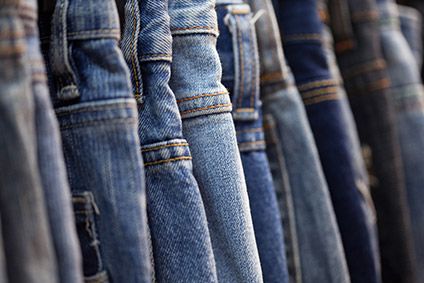
Denim experts from around the world have contributed to new guidelines launched today (16 July) to help fashion brands and manufacturers transform the way they produce jeans by tackling waste, pollution, and the use of harmful practices.
Led by the Ellen MacArthur Foundation, the ‘Jeans Redesign Guidelines’ set out minimum requirements on garment durability, material health, recyclability, and traceability – with the ultimate aim of ensuring jeans last longer, can easily be recycled, and are made in a way that is better for the environment and the health of garment workers.
“The way we produce jeans is causing huge problems with waste and pollution, but it doesn’t have to be this way,” says Make Fashion Circular lead Francois Souchet.
“By working together we can create jeans that last longer, that can be remade into new jeans at the end of their use, and are made in ways which are better for the environment and the people that make them. This is just the start. Over time we will continue to drive momentum towards a thriving fashion industry, based on the principles of a circular economy.”
About 40 denim experts from academia, brands, retailers, manufacturers, collectors, sorters and NGOs have contributed to the guidelines through the Jeans Redesign project, which has been created through the Ellen MacArthur Foundation’s Make Fashion Circular initiative.
Confirmed participants include Arvind Limited, Bestseller (through the Vero Moda brand), Boyish Jeans, C&A, Gap, Hirdaramani, H&M Group (through the H&M and Weekday brands), HNST, Kipas, Lee, Mud Jeans, Outerknown, Reformation, Saitex, and Tommy Hilfiger.

US Tariffs are shifting - will you react or anticipate?
Don’t let policy changes catch you off guard. Stay proactive with real-time data and expert analysis.
By GlobalDataIn addition, the guidelines have also been endorsed by clothing collectors and recyclers Bank and Vogue, Circular Systems, EVRNU, HKRITA, I:CO, Infinited Fiber Company, Lenzing, Recover, re:newcell, Texaid, Tyton Biosciences, Wolkat, and Worn Again. The NGOs Fashion Revolution and Textile Exchange have also backed the project.
The guidelines build on existing efforts to improve jeans production, including the open-source guide created following C&A and Fashion For Good’s joint initiative to develop C2C Gold Certified jeans.
The first pair of the redesigned jeans is due to go on sale in 2020, and the aim is that others will be inspired to join the project and produce jeans in line with the guidelines at scale.
The guidelines
The respect of the health, safety, and rights of people involved in all parts of the fashion industry is a prerequisite, along with working conditions improvement in manufacturing globally, the Ellen MacArthur Foundation says. Beyond this, the guidelines provide minimum requirements for jeans on durability, material health, recyclability, and traceability.
Durability
- Jeans should withstand a minimum of 30 home laundries, while still meeting the minimum quality requirements of the brands.
- Garments should include labels with clear information on product care.
Material health
- Jeans should be produced using cellulose fibres from regenerative, organic or transitional farming methods.
- Jeans should be free of hazardous chemicals and conventional electroplating. Stone finishing, potassium permanganate (PP), and sandblasting are prohibited.
Recyclability
- Jeans should be made with a minimum of 98% cellulose fibres (by weight).
- Metal rivets should be designed out, or reduced to a minimum.
- Any additional material added to the jeans, should be easy to disassemble.
Traceability
- Information that confirms each element of the Guideline requirements has been met should be made easily available.
- Organisations that meet the requirements will be granted permission to use the Jeans Redesign logo on jeans produced in line with the guidelines.
- The Jeans Redesign logo use will be reassessed annually, based on compliance with reporting requirements.



